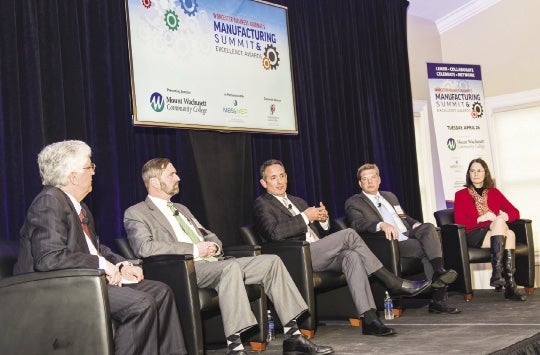Leslie Greis, owner and director for Worcester metal former and processor Kinefac Corp., knows some of the best growth opportunities can come from unusual places. That happened awhile back when Kinefac got a somewhat peculiar request from a zoo.
“It turns out that the elephants were getting out of their cages because they were plowing down the gate with the weight of a charging elephant, or they were pretty smart and figured out a way to open up the gate with their long snout,” Greis said. “And so, we were charged with, ‘Can you develop a better elephant gate?’”
Kinefac, with its hydraulic technology and mechanical engineering expertise, did build a better elephant gate, with a hydraulically-operated braking system. The new gate stumped the elephants, and not one has escaped since.
After that, Kinefac got lots of calls from companies wanting gates just as sturdy as the one they made for the zoo. As a metal former and processor, this was not Kinefac’s main line of business, but it was a great opportunity for the company.
“It’s developed into an interesting line of business we never thought we would be in,” she said.
Greis was one of four panelists discussing collaboration and partnerships in manufacturing at the Worcester Business Journal’s first Manufacturing Summit & Excellence Awards.
The panel was moderated by Peter Russo, growth and innovation program manager at the Massachusetts Manufacturing Extension Partnership (MassMEP) and featured Greis; Michael Detarando, president and CEO of Incom, Inc.; Neil McDonough, president and CEO of FLEXcon; and Bill Laursen, senior vice president for sales and strategy at The Coghlin Cos.
Collaboration was discussed in four contexts: training, product development, sales and general principles.
Incom had a similar experience to Kinefac in that it ventured into a business that it doesn’t usually touch. The company was tasked by the U.S. Department of Energy to develop a component for a detector that can detect the time and arrival of photons and sub-atomic particles people otherwise wouldn’t be able to see, Detarando said. Since Incom had never been in the market of doing that before, it partnered with universities, including the University of Hawaii, University of Chicago and the University of California, Berkeley.
The parties avoided intellectual property issues because of a mutual desire to be successful, Detarando said.
“If we’d run into it from the beginning, saying, ‘Ok, what’s our piece of this pie going to be, how do we divide it up?’… we would have all fought with each other and not focused on what the end goal really was,” Detarando said.
All four panelists said their companies partner with universities to not only develop products but also attract talent. Coghlin has an ongoing internship program with several schools, including Northeastern University.
Universities and community colleges are usually better at reaching out to FLEXcon than the company is to them, McDonough said.
“They are constantly putting forward either programs, offers, contacts. I think they do a great job,” he said.
Learning more about other companies’ roles in the supply chain can lead to great collaborative opportunities, Russo said.
“I’ll always ask [companies], ‘What happens to it the 10 minutes before you received it, what happens 10 minutes after you?’ And if you don’t really know … You’re giving up an opportunity,” he said.
As a contract manufacturer, Coghlin’s goal is to convert concepts to commercially scalable products, Laursen said. When a customer’s needs grow beyond what the scale of Coghlin’s capabilities are, the company then refers them to a larger-scale manufacturer, he said.
“We cannot be everything to everybody. We may have customers that grow beyond our capacity, and this company … They’re part of our alliance.” Laursen said. “When we can’t provide the value that’s required to make a great relationship, we can transition over to [them].”
In that same vein, Greis said partnering with industry associations, such as the Associated Industries of Massachusetts, has given her and her employees access to effective and convenient training classes. Kinefac has also worked with the Association for Manufacturing Technology to help the company export into foreign countries.
“The benefit of being involved with your industry associations is just very clear here, because you get involved and you’ll know they can be a partner for you in many ways,” Greis said.

